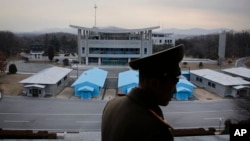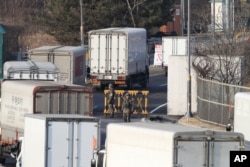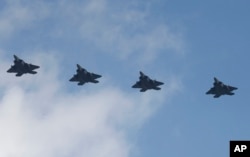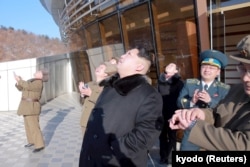A significant minority of South Koreans oppose Washington and Seoul led efforts to impose harsh economic sanctions on the Kim Jong Un government. These critics say this confrontational approach has fueled regional tensions and they warn that further punitive measures will only worsen the poverty stricken conditions in the North and greatly increase the risk of war.
"It’s not only North Korea that creates the atmosphere of fear and anxiety. It is also the U.S. and South Korean governments and politics," said Park Jung-eun with the People’s Solidarity for Participatory Democracy.
The People’s Solidarity for Participatory Democracy (PSPD) speaks for a large number of critics of President Park Geun-hye’s ruling Saneuri Party. It is a South Korean alliance of pro-democracy and human rights organizations often aligned with the political opposition in Seoul.
Kaesong closing
A recent South Korean public opinion poll found majority support for President Park’s decision to close the Kaesong Industrial Complex following North Korea’s fourth nuclear test in January and rocket launch this month. But a significant minority – 42 percent of those polled – opposed closing the complex.
Park claimed that 70 percent of the wages for the 54,000 North Korean workers, and other funding paid to the Kim Jong Un government to operate the jointly run facility, were used to fund the country’s nuclear program.
Critics say the government has provided no evidence to support its assertion. Rather than cutting funds from North Korea’s nuclear program or pressuring the Kim Jong Un government to comply with U.N. sanctions, they contend that closing Kaesong will disproportionally hurt hundreds of thousands of average people living in the region.
“From a humanitarian perspective, the shutdown actually has imposed the greatest impact on workers of the complex and their families,” said Father Park Chang-il, a Catholic priest with PSPD.
Engagement versus pressure
Washington also recently passed harsh new financial sanctions that could seize the U.S. assets of any company linked to illicit North Korean activities.
Opponents of a punitive or pressure based approach to North Korea say Washington and Seoul’s “uncompromising” stance is also contributing to an increasingly tense regional security situation.
Demanding Pyongyang halt its nuclear program before international peace talks can begin and offering no incentives to comply, they say, only pushes the Kim Jong Un government to take a confrontational stance in return.
“In order to resolve the North Korean nuclear issue, we have to pay the corresponding price,” said Lee Seung-whan with the PSPD’s Civil Peace Forum.
U.S. and South Korea responded to the recent North Korean nuclear test by bringing in nuclear capable aircrafts and ships.
Critics say this show of force, along with this year’s largest ever joint military drills, which include practicing pre-emptive strikes against targets in the North, will only strengthen the resolve and power of hardline leaders in Pyongyang.
On Tuesday North Korea's People's Army threatened to strike the South Korean presidential office and U.S. military installations in retaliation for the joint military drills.
South Korea's military responded Wednesday with a strong warning, saying any direct provocation would expedite the "collapse of [Pyongyang’s] dictatorial system."
Sunshine sunset
Recent history undermines the position of advocates for peace through engagement.
Public support in the rich, democratic South for basically paying for peace with the poor and repressive North, had dwindled in the last decade. Most aid and trade programs that began under Seoul’s Sunshine policy in 2000, ended in failure in 2010 after an alleged North Korean attack on a South Korean warship that killed 46 sailors.
North Korea’s withdrawal from international nuclear talks in 2009 and refusal to comply with a 2005 agreement to dismantle its nuclear weapons program greatly increased public support for a more conservative and punitive approach to dealing with the Kim government.
Also criticism that the administration of U.S. President Barack Obama has been inflexible on North Korea is inconsistent with other recent foreign policy efforts by Washington, including the nuclear agreement reached with Iran and normalizing relations with Cuba.
Prior to the January nuclear test, Washington says it agreed to a Pyongyang request to engage in peace treaty talks, reportedly without requiring the North to halt its nuclear program. However, the U.S. says it did insist that the nuclear issue be on the agenda and it was North Korea that rejected the compromise.
Aligning with China
The views of these South Korean critics align with Chinese leaders, who had been reluctant to support harsh international sanctions on North Korea for fear of destabilizing the country and triggering a surge of refugees across their border.
However on Tuesday Chinese Foreign Minister Wang Yi, at a joint news conference with U.S. Secretary of State John Kerry in Washington, indicated the two sides are close to agreeing on new, stronger U.N. sanctions to impose on North Korea.
China is North Korea's most important ally and largest trading partner. Without Beijing’s support, measures being considered to cut off trade and aid to its ally will likely have limited impact.
Youmi Kim in Seoul contributed to this report.








